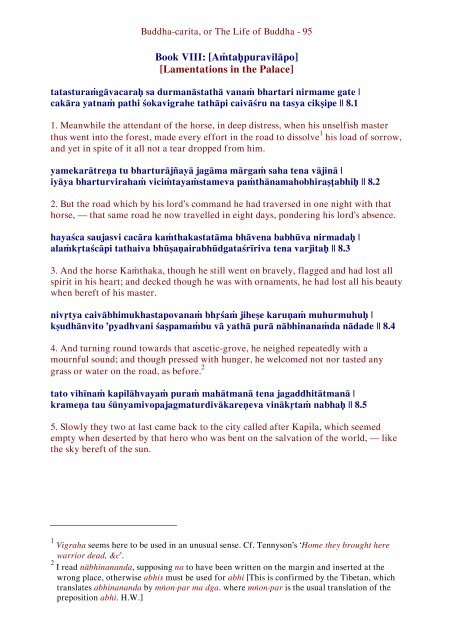The Buddha-Carita or The Life of Buddha by Ven. Aśvaghoṣa
A Sanskrit and English line by line (interlinear) version of one of the most important and influential biographies of the Buddha (together with extensive annotation).
A Sanskrit and English line by line (interlinear) version of one of the most important and influential biographies of the Buddha (together with extensive annotation).
You also want an ePaper? Increase the reach of your titles
YUMPU automatically turns print PDFs into web optimized ePapers that Google loves.
<strong>Buddha</strong>-carita, <strong>or</strong> <strong>The</strong> <strong>Life</strong> <strong>of</strong> <strong>Buddha</strong> - 95<br />
Book VIII: [Ataḥpuravilāpo]<br />
[Lamentations in the Palace]<br />
tatasturagāvacaraḥ sa durmanāstathā vana bhartari nirmame gate |<br />
cakāra yatna pathi śokavigrahe tathāpi caivāśru na tasya cikṣipe || 8.1<br />
1. Meanwhile the attendant <strong>of</strong> the h<strong>or</strong>se, in deep distress, when his unselfish master<br />
thus went into the f<strong>or</strong>est, made every eff<strong>or</strong>t in the road to dissolve 1 his load <strong>of</strong> s<strong>or</strong>row,<br />
and yet in spite <strong>of</strong> it all not a tear dropped from him.<br />
yamekarātreṇa tu bharturājñayā jagāma mārga saha tena vājinā |<br />
iyāya bharturviraha vicitayastameva pathānamahobhiraṣṭabhiḥ || 8.2<br />
2. But the road which <strong>by</strong> his l<strong>or</strong>d’s command he had traversed in one night with that<br />
h<strong>or</strong>se, — that same road he now travelled in eight days, pondering his l<strong>or</strong>d’s absence.<br />
hayaśca saujasvi cacāra kathakastatāma bhāvena babhūva nirmadaḥ |<br />
alaktaścāpi tathaiva bhūṣaṇairabhūdgataśrīriva tena varjitaḥ || 8.3<br />
3. And the h<strong>or</strong>se Kathaka, though he still went on bravely, flagged and had lost all<br />
spirit in his heart; and decked though he was with <strong>or</strong>naments, he had lost all his beauty<br />
when bereft <strong>of</strong> his master.<br />
nivtya caivābhimukhastapovana bhśa jiheṣe karuṇa muhurmuhuḥ |<br />
kṣudhānvito ’pyadhvani śaṣpamabu vā yathā purā nābhinanada nādade || 8.4<br />
4. And turning round towards that ascetic-grove, he neighed repeatedly with a<br />
mournful sound; and though pressed with hunger, he welcomed not n<strong>or</strong> tasted any<br />
grass <strong>or</strong> water on the road, as bef<strong>or</strong>e. 2<br />
tato vihīna kapilāhvaya pura mahātmanā tena jagaddhitātmanā |<br />
krameṇa tau śūnyamivopajagmaturdivākareṇeva vinākta nabhaḥ || 8.5<br />
5. Slowly they two at last came back to the city called after Kapila, which seemed<br />
empty when deserted <strong>by</strong> that hero who was bent on the salvation <strong>of</strong> the w<strong>or</strong>ld, — like<br />
the sky bereft <strong>of</strong> the sun.<br />
1 Vigraha seems here to be used in an unusual sense. Cf. Tennyson’s ‘Home they brought here<br />
warri<strong>or</strong> dead, &c’.<br />
2 I read nābhinananda, supposing na to have been written on the margin and inserted at the<br />
wrong place, otherwise abhis must be used f<strong>or</strong> abhi [This is confirmed <strong>by</strong> the Tibetan, which<br />
translates abhinananda <strong>by</strong> mon·par ma dga. where mon·par is the usual translation <strong>of</strong> the<br />
preposition abhi. H.W.]


















